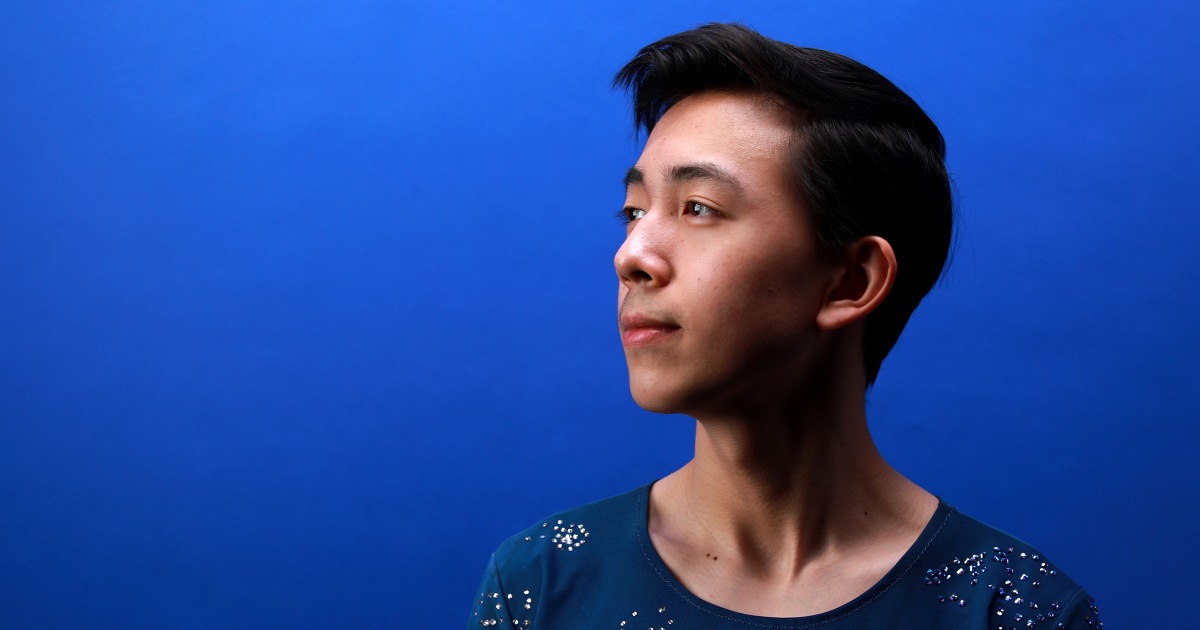
Olympic figure skater Vincent Zhou’s career has no shortage of memorable performances, but among his most celebrated is a stunning 2019 routine set to Joji’s “Slow Dancing in the Dark.” At one point, Zhou, dripping with angst, drops down to his knees and slides across the ice as the song hits its climax.
“I recall receiving plenty of messages on Instagram about just how emotionally impactful that performance was,” the athlete said of the routine that went viral and earned him a shoutout from Joji himself. “That made me really, really happy to see that people could relate to it and find something to embrace in it.”
The performance remains an example of Zhou’s skating style, one that draws upon vulnerability and emotion as a source of strength. It’s something he hopes to convey as one of 16 skaters competing on Team USA at the Winter Olympics in Beijing, which officially begins on Friday.
Now 21, Zhou was the youngest athlete on Team U.S. at the last Winter Games, in PyeongChang, South Korea, in 2018, where he finished sixth. Since then, he has grown up in the public eye, having weathered the world stage against the backdrop of an immigrant family upbringing. Now going into his second Olympics, Zhou has some reflections that come from confronting the intense pressures and joys of his art.
“There’s nothing wrong with acknowledging your deepest thoughts or your deepest emotions,” Zhou told NBC Asian America. “There’s nothing wrong with being an honest person, you know?”
The athlete, who made history as the first person to land a quadruple lutz at the Winter Games, has been skating since he was 5, first stepping onto the ice at a friend’s birthday party. Though the art form quickly evolved into a fierce passion, with Olympic dreams in his mind’s eye from a young age, Zhou acknowledged that some dismiss his sport, driven by the overemphasis on masculinity in society.
“There’s that stereotype where people look at skaters and they’re like, ‘Oh, they’re ballerinas in tutus,’ or stuff like that or, ‘all guys who do figure skating are gay,’” Zhou said. “I think those are all pretty ignorant perspectives.”
Experts have said that Asian men, in particular, must deal with emasculation, or being cast as effeminate and weak. Even Shohei Ohtani, the Japanese hitter and pitcher for the Los Angeles Angels who has excelled in baseball, a sport that’s traditionally recognized as a masculine by Western standards, was seen as an insufficient representative of the sport by some, like ESPN’s Stephen A. Smith. Constancio Arnaldo Jr., an assistant professor of Asian and Asian American studies at the University of Nevada, Las Vegas, previously told NBC Asian America that it’s likely that some felt Ohtani’s Asianness contested age-old ideas of what a dominant, powerful athlete looks like.
“It’s about masculinity,” Arnaldo said. “Asian and Asian Americans are always seen as not masculine enough.”
But Zhou, who was born in San Jose, California, to Chinese immigrants, said he believes that tremendous strength and fortitude is required to produce the beauty and emotion in ice skating, and that often gets overlooked. And perhaps it’s time to stop judging the legitimacy of sports and the ability of its athletes through this lens of Western masculinity.
“It’s a beautiful thing to have the athleticism to be able to do quadruples, which are essentially the limit of what’s physically possible in skating right now, but also to be able to give a beautiful performance and have great lines on the ice and have an appreciation for artistry,” Zhou said. “It’s just a sport. It’s just a thing that we all enjoy. I don’t think there’s a reason to make it about, ‘Guys have to be guys and girls have to be girls.’”
Zhou, who’s also a student at Brown University, speaks with a wisdom that he said has come after moments of significant triumph, but also struggle. Zhou said he and his mother packed up their bags and moved to Colorado when he was 8 so he could train with “better coaches and better conditions,” and he spoke openly about the mental health struggles he contended with in his adolescence.
Zhou said that he spent three years skating on a torn meniscus, which eventually required surgery. Recovery was particularly difficult, he remembers. At the time, Zhou was confined to his house, isolated from friends and kept off the ice. The athlete was subsequently left alone with his thoughts, feeling as though he had lost an opportunity of making the Olympic team one day and “achieving greatness,” Zhou explained.
“I would say I had pretty severe depression. I never had a formal diagnosis because back then, 10 years ago, resources for that weren’t readily available, especially for kids,” Zhou said. “I wouldn’t wish that on my worst enemies. It’s really a struggle, and my heart goes out to anybody who’s going through that.”
At the time he also felt trapped, he said, by some of the rules imposed by his “strict Chinese parents” — a common gripe among many children of immigrants who find themselves navigating the pressures of adolescence through both American culture and their heritage. But Zhou got himself not only back on the ice, but in a healthier mental space by turning to nature and proactively looking for inspiration. He also said he reassessed the tensions he felt with his parents. Many of the clashes were communication breakdowns, sometimes cultural ones, that required empathy to unpack, he said.
“If your parents are trying to set you on the right track, even if they have a different way of going about it than you … sometimes try to see what they’re actually saying,” Zhou said. Parents will say emotional things, but look under that. What are they actually trying to say to you? They’re trying to say, ‘We want you to succeed, we want you to have the best chance at getting a good job and starting a family one day,’ or whatever it may be. There’s always something to be grateful for.”
He emphasized that though his parents have come off as demanding in the past, their devotion to him has remained unquestionable. And ultimately, whenever he’s succeeded, they are the first people he thinks of.
“Achieving a certain level of success gives a person some perspective on how things are,” Zhou said. “And when I am standing on a podium, hearing the national anthem being played and having a medal placed around my neck, my thoughts … always go back to the people who helped me along the way.”
However, Zhou also wants to dispel the myth that strict Asian parents are the sole fuel to his success, rather than his own love of the sport. The trope, he explained, removes agency from the athlete themselves. And at the end of the day, if “we truly don’t want to do it, we’re not going to do it.”
“No matter what, it always takes a village to bring an athlete to the Olympic level. And it’s impossible to keep going at that level if you don’t love what you’re doing,” Zhou said. “While people might say, ‘This person’s parents forced them to do this,’ … when we’re on the ice, we’re the only people in control of our own bodies and minds.”
Zhou added: “I hope that people watching skating can see the passion that we have for the sport.”
Source: | This article originally belongs to Nbcnews.com









